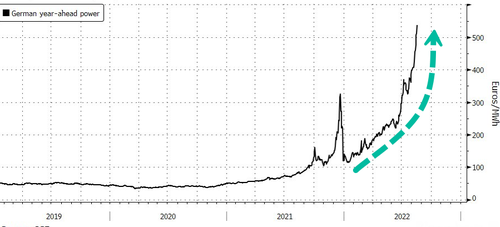SOURCE:
The latest sign lawmakers in Europe's industrial heartland are preparing for what could be a disastrous winter of reduced natural gas supplies from Russia and record high electricity prices is a new proposal to prioritize Germany's rail network for coal shipments over passenger services, according to Bloomberg, citing local newspaper Welt am Sonntag.
Even though Germany has promised to eliminate coal-fired power generation in the coming years, the historic energy crisis has made it more dependent on coal than ever as Russian flows of NatGas slump ahead of winter.
Economy Minister Robert Habeck recently said increased reliance on coal is bitter but necessary.
And we must give our readers a spoiler alert: there's no way Germany will eliminate coal as a power source by 2030. If anything, it will be more reliant on it than ever unless it extends the life of its nuclear power plants.
"Priority is normally given to passenger transport in Germany, and timetables are geared toward it. As a result, there's a risk of chaos on the rails from making the change," Bloomberg said, citing the draft.
There's a strong possibility the draft will be passed as a way to accelerate coal shipments via rail to power plants ahead of winter to ensure there are adequate supplies. Coal power generation is expected to soar in Europe's largest economy this winter as a move to boost energy security.
The draft plan comes as German year-ahead power, a European benchmark, skyrocketed last week to a record 570 euros per megawatt-hour, with French prices rising as much as 3% to 720 euros. Coal prices in Europe also hit a record of 310 euros a ton.
Russia continues to squeeze NatGas flows to Europe as a heat wave limits hydroelectric and nuclear production. Rhine River levels have dropped to dangerously low levels, disrupting commodity cargos on the continent's most important inland waterway. However, the good news this weekend is water levels have risen.
Germany's increasing coal use this winter will be made possible by the rail system delivering supplies to power plants.
So much for the Europeans spearheading efforts toward green energy as Putin's energy insecurity strategy appears to be a major success where it has caused stagflation and chaos across Germany.

